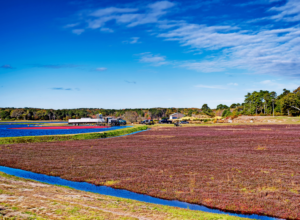 2 min read September 2023 — A leading cranberry producer in the U.S., Massachusetts is expected to see a growing market for the wetland fruit as the U.S. and India recently agreed on cutting tariffs for cranberries in addition to other U.S. products.
2 min read September 2023 — A leading cranberry producer in the U.S., Massachusetts is expected to see a growing market for the wetland fruit as the U.S. and India recently agreed on cutting tariffs for cranberries in addition to other U.S. products.
On Sept. 8, United States Trade Representative Katherine Tai announced that India will reduce tariffs on fresh, frozen and dried cranberries to 10% and processed cranberry products to 5%, down from 30% prior to the agreement.
“Certainly, it’s something that’s going to have that long-term impact,” said Massachusetts Cranberries Executive Director Brian Wick, as cited by Boston Globe. “It will give us a better advantage in the marketplace.”
Cranberry crops contribute $1.7 billion to the Massachusetts economy and are expected to see an increase in exports to the world’s most populous country. The Indian market represents major potential as advocates of the tart red fruit have marketed its health benefits as well as being an alternative ingredient for various Indian dishes. The U.S. is the leading producer of cranberries, with Wisconsin and Massachusetts leading all states in output.
According to the United States Department of Agriculture, the Bay State’s cranberry production totaled 2.26 million barrels in 2022, a 31% increase from 2021. This year, Massachusetts will account for nearly one-quarter of all cranberries harvested in the U.S.
With an annual crop value of $73.4 million, cranberries are the state’s most important agricultural food commodity produced and support nearly 6,400 jobs in the Commonwealth.
While the latest announcement on lifting cranberry tariffs creates an opportunity for growers in Massachusetts, the industry has dealt with harsher weather conditions this year, from an uncharacteristically cold spring to an extra wet July.
“It’s been a challenging year for our growers but optimism prevails for a solid crop,” said Wick, as cited by WBUR. “The cold spring produced many frost nights, a few resulting in scattered frost damage to the tender vines. The weather turned more favorable for pollination season in June but transitioned to a rainy July. Despite weather-related difficulties, our resourceful growers stand strong through each challenge.”
For more information, please visit:
